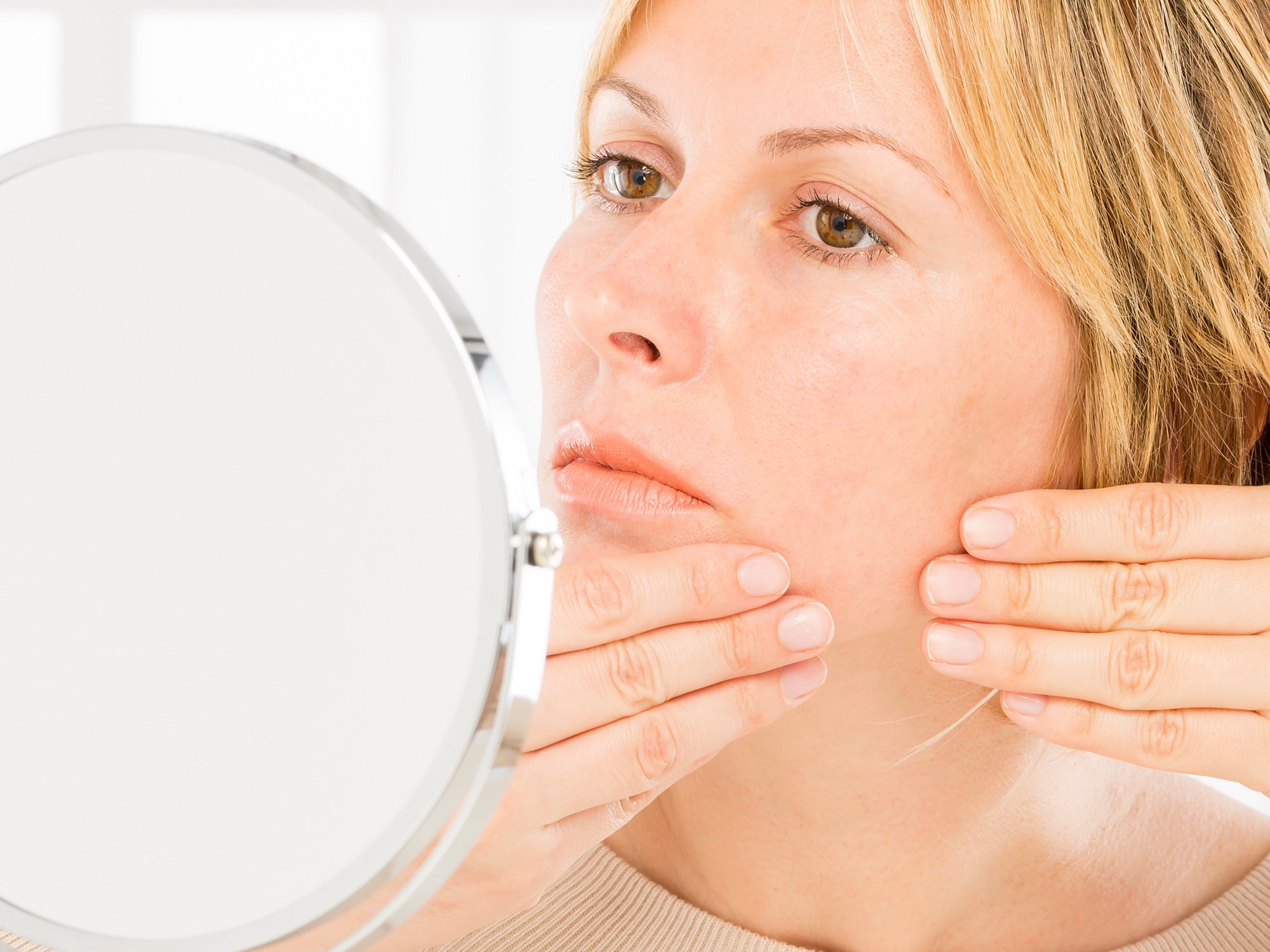Get Easy Health Digest™ in your inbox and don’t miss a thing when you subscribe today. Plus, get the free bonus report, Mother Nature’s Tips, Tricks and Remedies for Cholesterol, Blood Pressure & Blood Sugar as my way of saying welcome to the community!
What does adult acne and chronic disease have in common?

If you’ve ever dealt with adult acne, you know how frustrating it can be.
No matter what products you slather on your face, your acne just won’t budge. One pimple goes away just in time for another one to take its place.
Of course, it is possible to rid yourself of these pesky pimples for good. But first, you’re going to have to find a solution that goes more than skin deep.
Because, the truth is, most chronic skin issues aren’t presenting because of what’s happening on the surface. They’re a sign of deeper imbalances in your body and lifestyle that could lead to bigger problems.
So instead of putting all of your hope into topical acne solutions, face creams, toners and masks, start addressing the root of the problem….
The master hormone connection
While it’s not exactly groundbreaking news that lifestyle factors like diet and stress contribute to the condition of your skin, you may be surprised to find out that your body’s master hormone — insulin — has a lot to do with it…
Researchers at the Icahn School of Medicine at Mount Sinai in New York City found that women with adult acne are more likely to have a low intake of fruits and vegetables. They are also more likely to eat foods with a high-glycemic index, like bread, rice, chips, crackers and sweets.
These foods cause your blood sugar to spike, which raises your insulin levels and leads to more acne. That’s because insulin, which acts as your body’s master mediator, encourages your body to produce certain growth factors and hormones that can increase your skin’s oil production and cause clogged pores.
And high stress levels create a similar hormonal reaction in your body. Basically, when you’re stressed, your adrenal gland goes crazy and increases the amount of male hormones (androgens) your body produces.
That’s probably why women in this recent study with high or very high stress levels were a whopping three times more likely to have acne.
Adopting an anti-acne lifestyle
To get your hormones and acne in check, you need to cut back on high-glycemic foods that throw your insulin out of whack. And believe me, if you don’t get your insulin balanced, acne will be the least of your troubles. I’m not just referring to diabetes either…
I’m talking about the insulin factor.
The insulin factor is something doctors who practice alternative medicine have been aware of for decades. It turns out that insulin acts as your body’s metabolic mediator, capable of boosting your health, helping you avoid disease and slowing aging — all the way down to your DNA.
But conventional doctors can’t wrap their heads around insulin outside of the context of diabetes. They won’t tell you that when your insulin is dysfunctional you are wide open to heart disease, osteoporosis, cancer… even Alzheimer’s.
So your acne could just be the earliest warning sign that out of control insulin has you headed for chronic disease. But you can derail the disease path…
One way to do this is to increase your intake of fresh fruits and vegetables by focusing on eating the foods within the following categories:
- Dark-leafy greens (spinach, kale, chard, romaine, etc.)
- Orange and yellow vegetables and fruits (carrots, sweet potatoes, lemon, grapefruit, etc.)
- Fatty fish (salmon, mackerel, sardines, etc.)
- Whole grains (quinoa, buckwheat, barley, brown rice, etc.)
- Berries (blueberries, blackberries, strawberries, etc.)
- Beans (chickpeas, kidney beans, black beans, etc.)
- Nuts (walnuts, almonds, pistachios, etc.)
- High-quality meat and eggs (grass-fed beef, organic chicken and turkey, organic eggs, etc.)
- Fermented foods (sauerkraut, kefir, kimchi, kombucha, etc.)
If you stick to these food categories, you’ll begin to see an improvement in your skin — and overall health — in no time. And whatever you choose to eat, always make sure you’re drinking water all-day, every day. In fact, if you want to clear up your acne quicker, drink a large glass of water with a wedge of lemon every morning when you wake up. That will help detox your body and skin.
Once you get your diet in order, the next step to adopting an anti-acne lifestyle is getting a handle on your stress levels. No matter how busy you are, it’s urgent to set aside time to de-stress. That means giving yourself at least 30 minutes of relaxation time per day to meditate, do a yoga routine, listen to music, drink a cup of tea (there’s an ancient Indian herbal tea that’s earned the nickname liquid yoga), take a walk, play a round of golf, write a poem, get a massage or take a nap.
Editor’s note: Are you feeling unusually tired? You may think this is normal aging, but the problem could be your master hormone. When it’s not working, your risk of age-related diseases skyrockets. To reset what many call “the trigger for all disease” and live better, longer, click here to discover The Insulin Factor: How to Repair Your Body’s Master Controller and Conquer Chronic Disease!
Sources:
-
“Why acne can strike women after the teen years.” Medical Xpress. http://medicalxpress.com. Retrieved December 28, 2016.
-
Di Landro, et al. “Adult female acne and associated risk factors: Results of a multicenter case-control study in Italy.” Journal of the American Academy of Dermatology, 2016; Vol. 75; 6, p1134–1141.
-
“Western Diet Found to Influence Acne, According to New Study Led by Colorado State University Scientist.” Colorado State University. http://www.news.colostate.edu. Retrieved December 28, 2016.














